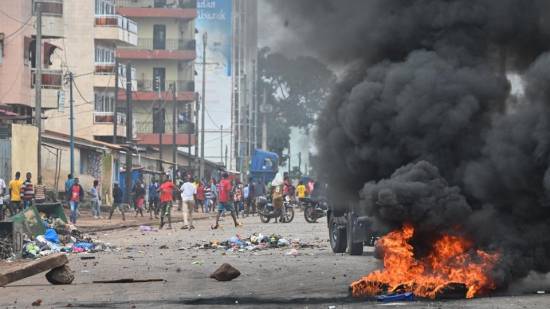Guinea opposition calls for protests after junta denies role in new deaths Featured
A political coalition has called for fresh protests a day after Guinea's junta denied its forces had shot dead two teenagers at opposition demonstrations earlier in the week.
The National Front for the Defence of the Constitution or FNDC, a coalition of political parties, trade unions and civil society organisations, called for fresh protests in messages posted on social media on Saturday.
The junta banned the group earlier this month.
On Wednesday, FNDC, relatives and neighbours said that security forces in Guinea's capital had shot dead two teens as their convoy drove through the capital Conakry during protests against the junta.
FNDC accused junta leader Mamady Doumbouya's forces of having killed the pair, aged 17 and 19.
Junta spokesperson Amara Camara said in a statement released late on Friday: "The rumours about shots fired from the presidential motorcade are false and unfounded."
Deaths in forbidden protests
FNDC staged rallies on July 28 and 29 in which five people were killed. It called for the demonstrations last Wednesday –– also forbidden by the junta –– at which the two teenagers were shot dead.
Ibrahima Balde was killed by a projectile fired by a member of the security forces in Wanidara, a suburb of Conakry that has been the scene of clashes, his father Mohamed Cherif told the AFP news agency.
A relative of the young man, speaking on condition of anonymity, said he was hit by a soldier's bullet as the junta leader's motorcade passed through the neighbourhood.
Oumar Barry, a 17-year-old secondary school student, died later in nearby Koloma district. "They shot him in the stomach in Koloma," said his neighbour, Pathe Diallo.
Government warning
Justice Minister Charles Alphonse Wright, who met with relatives of Barry, said that justice would be done, according to a statement read out by ministry spokesperson Yaya Kairaba Kaba Friday.
But the statement also made clear that anyone calling for protests would also have to answer before the courts, denouncing any attempt to exploit the deaths of the teenagers.
During Wednesday's banned demonstration, police were heavily deployed around the city, and demonstrators in one flashpoint suburb of Conakry hurled stones at the security forces who retaliated with teargas.
The poor but mineral-rich state has been ruled by the military since a coup last September that ousted president Alpha Conde, in power since 2010.
In May, the junta banned all protests and on August 6 decreed the dissolution of the FNDC.
The FNDC spearheaded protests against Conde while he was in power, fiercely opposing his bid for a third term that it said was unconstitutional. The demonstrations were often brutally repressed.
Since the coup, the group has turned its focus on the junta, progressively amplifying its concern over human rights and the pace of return to civilian rule.
Doumbouya has pledged to hand over power to elected civilians within three years –– a timeline that fellow West African states want accelerated.
Source: AFP


